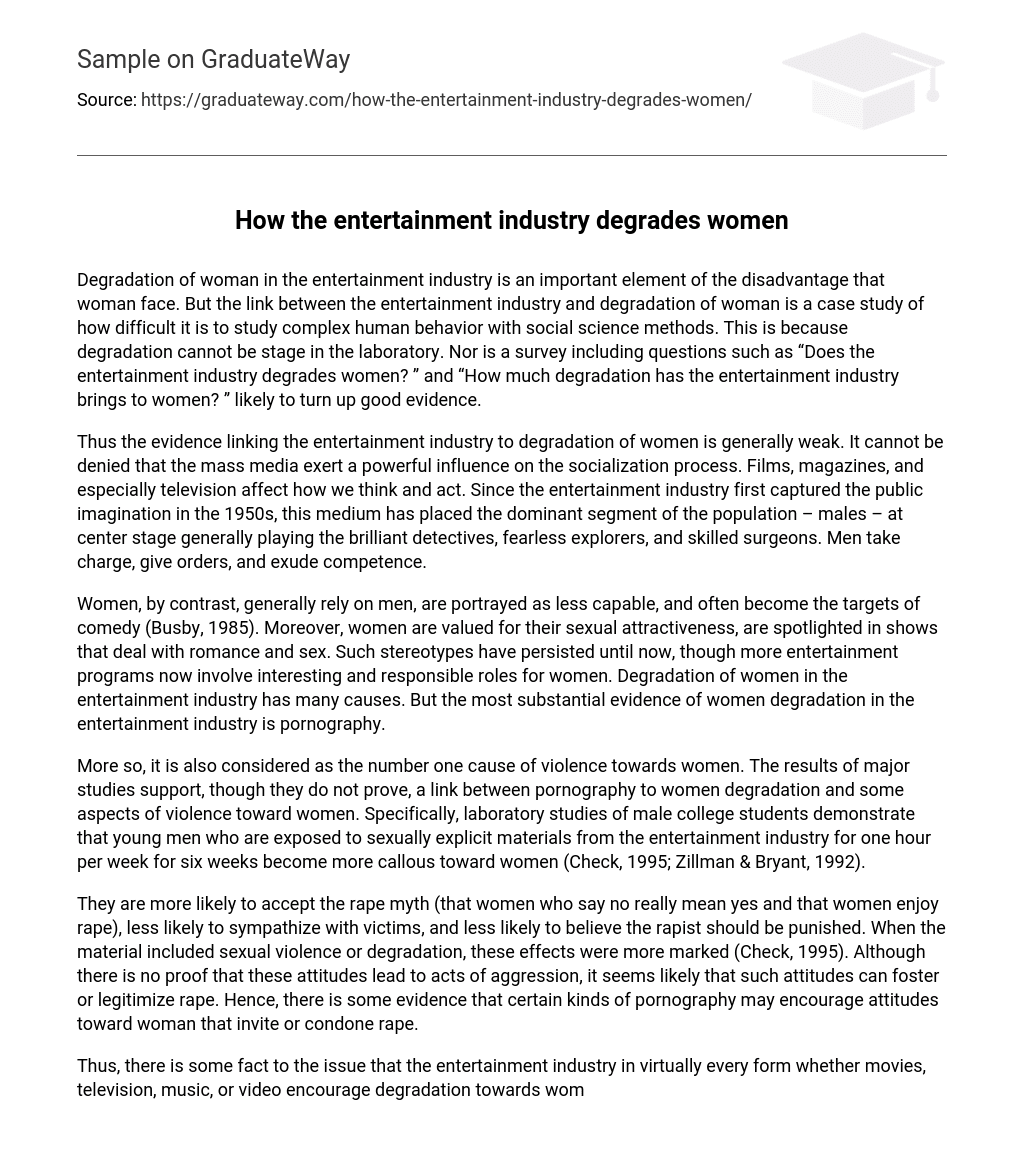Degradation of woman in the entertainment industry is an important element of the disadvantage that woman face. But the link between the entertainment industry and degradation of woman is a case study of how difficult it is to study complex human behavior with social science methods. This is because degradation cannot be stage in the laboratory. Nor is a survey including questions such as “Does the entertainment industry degrades women? ” and “How much degradation has the entertainment industry brings to women? ” likely to turn up good evidence.
Thus the evidence linking the entertainment industry to degradation of women is generally weak. It cannot be denied that the mass media exert a powerful influence on the socialization process. Films, magazines, and especially television affect how we think and act. Since the entertainment industry first captured the public imagination in the 1950s, this medium has placed the dominant segment of the population – males – at center stage generally playing the brilliant detectives, fearless explorers, and skilled surgeons. Men take charge, give orders, and exude competence.
Women, by contrast, generally rely on men, are portrayed as less capable, and often become the targets of comedy (Busby, 1985). Moreover, women are valued for their sexual attractiveness, are spotlighted in shows that deal with romance and sex. Such stereotypes have persisted until now, though more entertainment programs now involve interesting and responsible roles for women. Degradation of women in the entertainment industry has many causes. But the most substantial evidence of women degradation in the entertainment industry is pornography.
More so, it is also considered as the number one cause of violence towards women. The results of major studies support, though they do not prove, a link between pornography to women degradation and some aspects of violence toward women. Specifically, laboratory studies of male college students demonstrate that young men who are exposed to sexually explicit materials from the entertainment industry for one hour per week for six weeks become more callous toward women (Check, 1995; Zillman & Bryant, 1992).
They are more likely to accept the rape myth (that women who say no really mean yes and that women enjoy rape), less likely to sympathize with victims, and less likely to believe the rapist should be punished. When the material included sexual violence or degradation, these effects were more marked (Check, 1995). Although there is no proof that these attitudes lead to acts of aggression, it seems likely that such attitudes can foster or legitimize rape. Hence, there is some evidence that certain kinds of pornography may encourage attitudes toward woman that invite or condone rape.
Thus, there is some fact to the issue that the entertainment industry in virtually every form whether movies, television, music, or video encourage degradation towards women. While it is true that pornography degrades women and one could get a general agreement that the entertainment industry has the materials that constitutes a menace to women, for example, pictures of sexual torture and dismemberment or sexual acts involving women; this is a very difficult social issue.
Moreover, the difficult issue is control of pornography conflicts with constitutional rights and so this is another degradation issue not just for women but also for men. So, the difficult issue now is where, along a continuum running from women naked statues in the park to the extremes of sexual sadism, to draw the line. In the United, two constitutional freedoms are crucial in defining obscenity: freedom of speech and freedom of the press. Neither right is absolute, but our constitution requires that we err on the side of underregulation rather than overregulation.
Nevertheless, when speech or publications constitute a clear and present danger, they may be regulated. The question, now, is whether some pornographic materials constitute a serious harm to women in particular, such that they should be declared obscene and regulated by the state. The Attorney General’s Commission on Pornography reviewed hundreds of studies and interviewed dozens of expert witnesses on both sides. At the end, it acknowledged that it did not have enough information to prove a linkage between pornography in the entertainment industry and degradation of women.
But it did, however, conclude that there was enough evidence of a link between pornography and violence toward women that a prudent government should act to reduce the danger to its citizens. As a result, the Commission made 92 recommendations to federal, state, and local governments to restrict publication and dissemination of degrading and violent pornography. These recommendations are very controversial and opposed by many. Opposition comes from two sources. First, many people argue that any restriction of freedom of the press will put a chill on freedom of speech (Linz et al. , 1996).
They argue that once a precedent for censorship has been established, the authority of the Constitution’s protection is fatally undermined. From this point of view, only the most compelling evidence of terrible social damage would be sufficient to justify censorship of any kind. This brings up the second point for this issue: the quality of the evidence. Data gathered in dozens of studies using a variety of study designs suggest that pornography can change men’s attitudes toward women. It is an inference rather than a fact that these attitudes create a climate that encourages and supports degrading acts of women, worse is rape.
For many people, this evidence is not strong enough to justify censorship. But for personal involvement of women in this issue, women are much more likely to accept the entertainment industry/degradation linkage as strong enough to justify public action. As with most issues of social policy, empirical evidence is insufficient to decide the case. Policy, in fact, is always in part a matter of values. Policy is also a matter of politics. Which side has the most evidence may be less important than which side has the most power.





